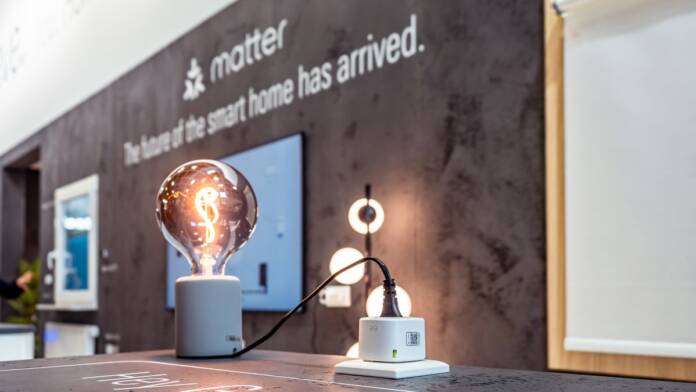Accessory manufacturers can access specifications for version 1.0 of Matter. The first market-ready products are expected in November.
The IP-based communication standard Matter is ready. The responsible Connectivity Standards Alliance (CSA) today released the specifications for Version 1.0 of the standard, which is intended to ensure compatibility between devices from different manufacturers. Manufacturers can now customize eligible smart home accessories using a software development kit and have them tested by authorized testing labs. The open source Matter SDK is available on Github.
Market-ready Matter products can be expected in just a few weeks. The CSA confirmed that participating companies plan to present compatible accessories during a November 3 launch event in Amsterdam. The first version of Matter supports functions for lighting, switches, heating and cooling technology, fans, window coverings and blinds, security sensors, door locks, televisions and bridges.
First devices certified in “a few days or a few weeks”.
The brands that have their products certified first include the Matter initiators Amazon, Apple, Google and Samsung, as well as around 280 smaller and larger technology manufacturers who worked on the first Matter version. Because of their lead in time, it should only take “a few days or a few weeks” for their accessories to receive the Matter certificate, ideally, said the responsible CSA director Jon Harros on the subject of Matter at the IFA. The standard was one of the most important trade fair trends there.
How many devices can be expected to start in November remains unclear. In the final test rounds before the change from Matter 0.9 to 1.0, manufacturers had entered around 130 products. They are in different stages of development. Therefore, they are unlikely to be ready for the market until the official Matter launch. According to the CSA, practical technology demos are firmly planned for the Amsterdam event. But it will probably be both officially released products and those that are still in the testing process.
The first batch of Matter accessories will come from companies that can upgrade existing devices with Matter with a firmware update. Amazon, Google, Samsung, Philips Hue, Wiz, Eve and Bosch have announced corresponding updates. Google already offers accessory developers instructions for the Matter upgrade and is working on a new home app that takes the new standard into account.
As a technical requirement, the Matter specifications require a compatible way of data transmission in addition to a certain minimum of computing and storage power. You can choose between the IP-based protocols Wi-Fi and Thread. Other radio standards can only be integrated into a Matter network via a LAN bridge.
What Matter promises smart home fans
As a kind of superstandard, Matter is supposed to bring three concrete advantages to smart home fans. Firstly, the setup is easier because you don’t have to put the devices into operation with various manufacturer apps. Instead, the standard software from Amazon, Apple, Samsung and Google is sufficient. A rights release enables the devices to be used in parallel in all of these previously separate ecosystems. At the IFA, for example, a demo from the manufacturer Eve showed how previously HomeKit-exclusive accessories can be operated locally with Google and Amazon voice commands.
Secondly, unlike the networking approaches that have been widespread up to now, there is no obligation to use the cloud for mass-produced smart home technology. Matter-compatible devices exchange switching signals and sensor data exclusively in the local home network. Third, data security should be a fixed part of network operations. The exchange of data is purely encrypted. The comparison with unchangeable device certificates in a blockchain database is intended to prevent manipulated accessories from latching on and eavesdropping on data.
If Matter works as announced, it will simplify the previously tedious search for suitable accessories and reduce dependency on the cloud. However, the communication standard will not be able to completely eliminate the complexity of the market. So far, it has not supported any complex automatic systems or remote access. That remains a matter for the respective manufacturers, who can continue to offer these and other additional functions in their own apps with or without a cloud.
Recommended Editorial Content
With your consent, an external price comparison (voonze price comparison) will be loaded here.
Always load price comparisons
I consent to external content being displayed to me. This allows personal data to be transmitted to third-party platforms (voonze price comparison). Read more about our privacy policy.
(then)














